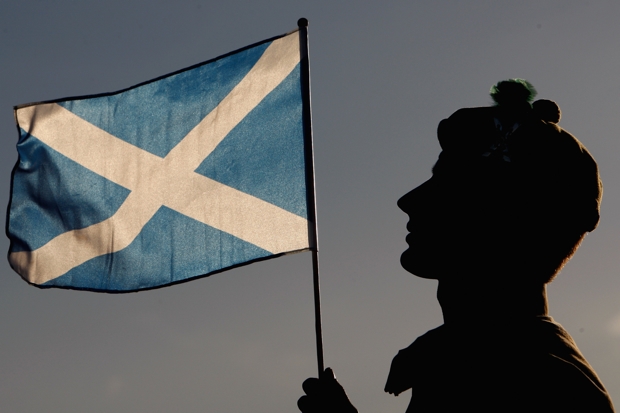I wonder how many Scots who voted ‘Yes’ in last year’s referendum are watching events unfold in Greece and having second thoughts? It’s not quite a ‘there, but for the grace of God’ moment, but it’s not far off. This analogy depends upon two big assumptions, both of which will be disputed by the nationalists.
The first is that Scotland would not have automatically been allowed to remain in the EU following a ‘Yes’ vote, but, as a new state, would have had to apply for membership and, as a condition of joining, would have been forced to join the euro.
How questionable is this assumption? The Scottish government’s position has long been that an independent Scotland would automatically inherit the UK’s EU membership and opt-outs, including the opt-out from the single currency. But the legal basis for this view is pretty threadbare. Alex Salmond claimed he’d received advice from the government’s law officers corroborating this view and his ministers then spent £20,000 of taxpayers’ money resisting a Freedom of Information request to disclose exactly what this advice was. When that battle was lost, Salmond was forced to admit that no such advice had ever been given.
The view of most experts on international law is that an independent Scotland would have to re-apply for membership of the EU and would, in all likelihood, be forced to join the Eurozone, as other recent joiners have had to do. (See here for a robust statement of this position by Andrew Lilico.)
The second assumption is much less controversial, namely, that an independent Scotland would quickly run out of money. I wrote about this in The Spectator earlier this year, pointing out that Scotland would be £8.5 billion a year worse off if it seceded from the United Kingdom. If you add that to Scotland’s share of the UK’s annual deficit – which it would inherit – it’s hard to see Scotland staving off bankruptcy for very long. In order for Scotland to be financially better off outside the union – the ludicrous claim made in the Scottish government’s 2013 white paper – North Sea oil revenue would have to increase by several thousand per cent. Either that, or the Scottish economy would have to grow 15 per cent faster than the UK’s. And remember, the British economy is currently the fastest-growing in Europe. It seems unlikely, to put it mildly, that an independent Scotland that had joined the euro could service its annual deficit by borrowing, particularly if you factor in that it would begin life £100 billion in the red – Scotland’s share of the UK’s national debt. (For a detailed analysis of an independent Scotland’s financial predicament, see this recent blog post by Kevin Hague.)
So it seems probable – more than 50 per cent likely, at the very least – that an independent Scotland would have to go cap in hand to the troika within a couple of years, following the well-trodden path taken by other bankrupt European states. And we know from the Greek example what the price would be: the complete surrender of fiscal autonomy. In effect, an independent Scotland would have to hand over control of the country’s finances to the German Finance Minister and his cronies in the European Central Bank and the IMF.
In that scenario, the Scottish government would have significantly less fiscal autonomy than it does at present, let alone what it will have when the Scotland Bill is passed. In other words, a vote for ‘independence’ would have been a vote for ‘dependence’ and, ultimately, much less control over Scotland’s destiny than the Scottish people have at present. The irony is, many of the ‘Yes’ voters would have been voting for an end to ‘Tory austerity’. If they want to know what austerity really looks like, they should take a gander at the terms of the deal currently being offered to Greece. As Ambrose Evans-Pritchard says in the Telegraph, ‘The terms are harsher by a full order of magnitude than those rejected by Greek voters in a landslide referendum a week ago.’ And that’s one more thing to bear in mind. The independence referendum would have been the last time the Scottish people had any democratic influence over their own affairs. Supporters of the SNP should thank their lucky stars they lost.







Comments